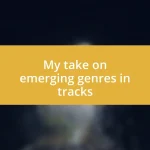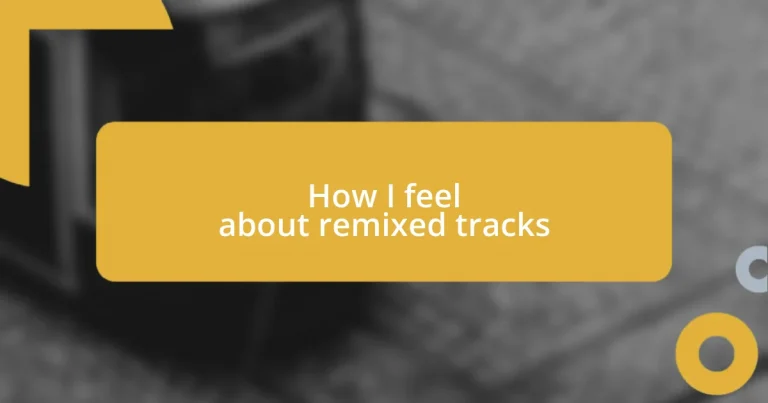Key takeaways:
- Remixes breathe new life into original songs, transforming emotional connections and inviting listeners to explore different musical interpretations.
- They broaden musical horizons, attracting new audiences and reigniting interest in older tracks, often leading to unexpected collaborations between artists.
- Remixes evoke powerful emotional responses, reshaping listeners’ experiences and reflecting the complexities of life through innovative soundscapes.
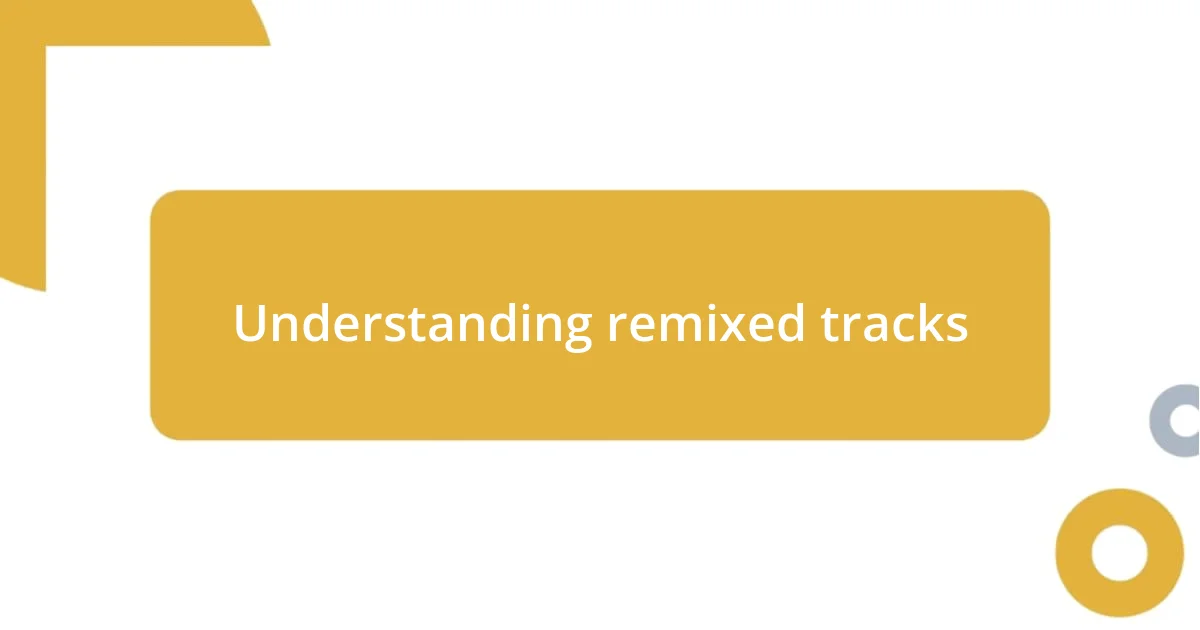
Understanding remixed tracks
Remixed tracks can often breathe new life into original songs, transforming them into something fresh and uniquely appealing. I remember the excitement of hearing a popular hit reimagined with a new electronic beat that instantly made it my go-to track for workouts. It’s fascinating how a remix can shift our emotional connection to a song, isn’t it?
When I listen to a remix, I often find myself pondering the creative process behind it. What did the remixer hear in the original that inspired them to take this direction? This curiosity makes each remix a little adventure of its own, allowing me to discover parts of the song I might not have appreciated otherwise. There’s a particular satisfaction in recognizing elements from the original that are expertly woven into the new version.
Some remixes resonate with me on a deeper level, especially when they capture the essence of the original while adding unexpected layers. I recall hearing a reggae remix of a pop song that transformed its upbeat vibe into something laid-back and chill, creating an entirely different atmosphere. It’s moments like these that remind me of music’s incredible ability to evolve and connect with listeners in various ways.
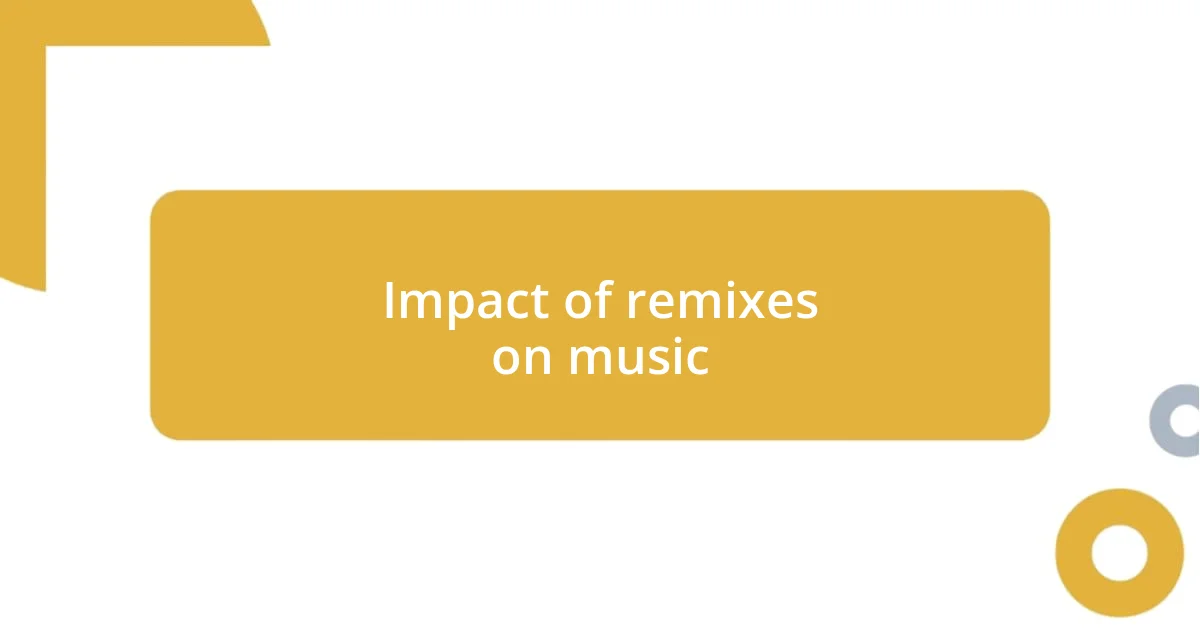
Impact of remixes on music
Remixes have a profound impact on how we experience music by encouraging exploration beyond the familiar. I remember one instance when I stumbled upon a jazz remix of a classic rock song. It changed everything for me—it was as if I was hearing the track anew. This kind of reinterpretation can lead listeners to genres they might never have explored, broadening their musical horizons and deepening their appreciation.
- Remixes can attract new audiences who might not normally listen to the original genre.
- They can transform the emotional landscape of a song, allowing it to resonate differently with various listeners.
- Popular remixes often dominate the charts, showcasing that the music industry embraces innovation.
- A good remix can reignite interest in an older track, bringing it back to life in a contemporary context.
- Collaborations between artists through remixes can create unexpected synergies, enhancing creativity within the music community.
Engaging with remixes can evoke nostalgic feelings, too. For instance, the first time I heard a hip-hop remix of an ’80s anthem, it sparked a rush of memories from my childhood. It’s intriguing how remixes can weave personal history into the fabric of the music, giving us new ways to relate to both the old and the new.
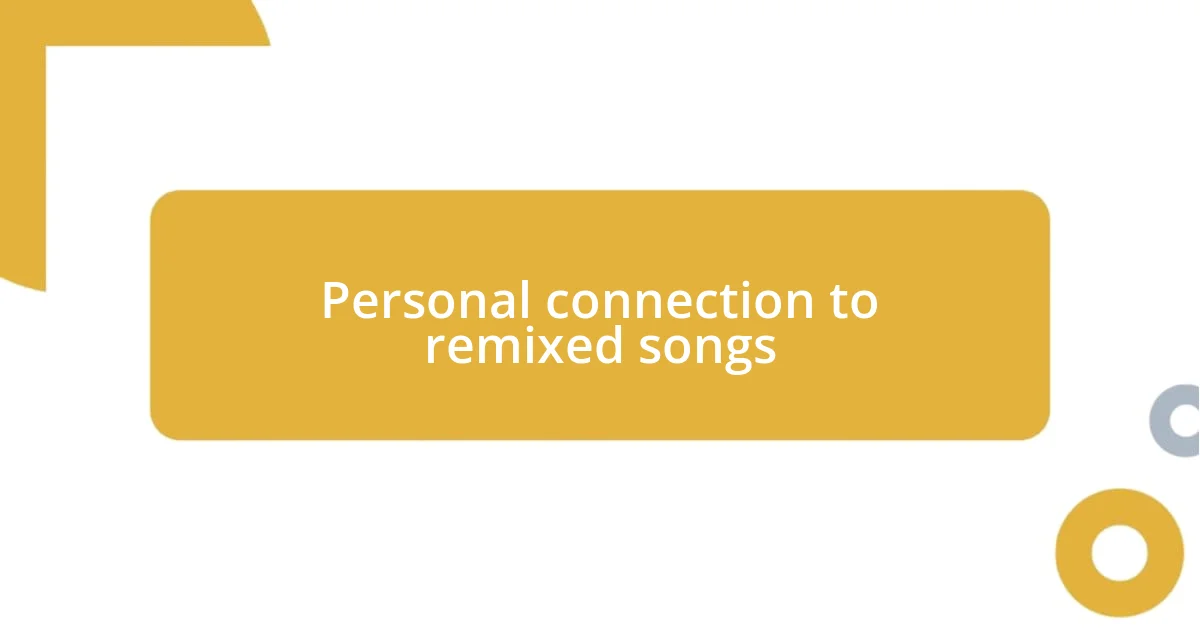
Personal connection to remixed songs
Listening to remixed songs often sparks a strong emotional connection for me. I recall the first time I heard a deep house remix of a song that was part of a cherished memory from a road trip. Suddenly, that remix transported me back to sunny days with friends laughing and singing along. It was like re-experiencing joy in another form, showing me how powerful a new arrangement can be in evoking nostalgia.
With each remix, I discover how artists reinterpret the essence of a track, which leads to unexpected emotions surfacing. I have often found myself swaying to a downtempo remix of an upbeat pop song, feeling a sense of calm and tranquility that I didn’t get from the original. That ability to reshape my mood—turning an energized tune into something soothing—really highlights the artistry behind remixes and how they can resonate differently within me.
What I find most fascinating is how remixes can bring new perspectives to an already beloved song. For instance, I recently heard a remix that stripped the original down to its vocals and added a minimalist piano accompaniment. This new version allowed me to appreciate the heartfelt lyrics in a different way, making me feel more connected to the artist’s original intention. It’s moments like these that make me realize how remix culture adds depth to my personal music journey.
| Original Song | Remix Style |
|---|---|
| Pop Anthem | Deep House Remix |
| Classic Rock | Jazz Fusion Remix |
| 80s Hit | Hip-Hop Remix |
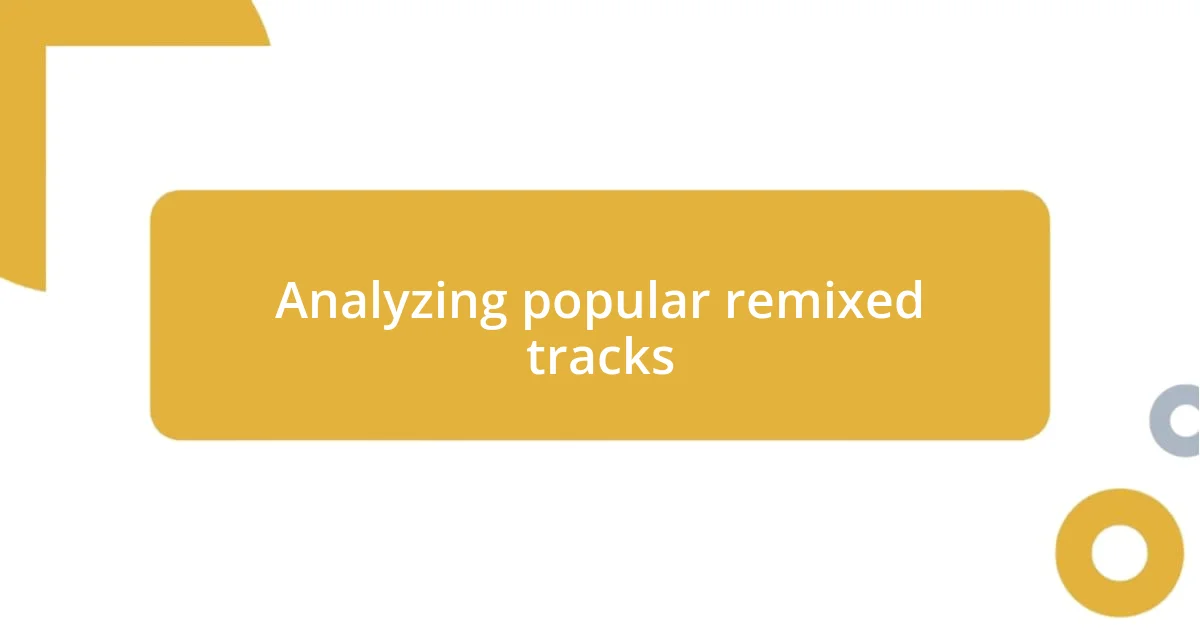
Analyzing popular remixed tracks
When I think about popular remixed tracks, I’m often struck by how they can breathe fresh life into songs I thought I knew intimately. Take, for example, a remix I stumbled upon of a pop sensation that originally had a driving beat. The remixer opted for a slower tempo and incorporated lush strings, completely shifting the mood. It made me ponder: How is it that a simple change in pace can evoke such intense emotions? I ended up feeling a wave of vulnerability, something I never connected with in the original.
I’ve also noticed how certain remixes elevate tracks by layering different genres. One standout was a remix of a folk ballad that introduced elements of EDM. I was taken aback at how seamlessly it merged heartfelt lyrics with infectious electronic beats. It made me question my own boundaries with music—could I find joy in combinations that once felt unthinkable? This particular remix not only reached a wider audience but also sparked a curiosity in me to explore folk-infused EDM tracks that I hadn’t considered before.
Moreover, the magic of collaboration in remixes often brings unexpected surprises. I remember listening to a remix where a hip-hop artist teamed up with an indie pop musician. The blend of their distinct styles created a soundscape that was both fresh and nostalgic. It made me smile, realizing that artists from different backgrounds can unite to create something truly enchanting. Could this kind of artistic union redefine our understanding of what music can be? To me, it’s a beautiful testament to the idea that remix culture fosters creativity and connection within the music community.
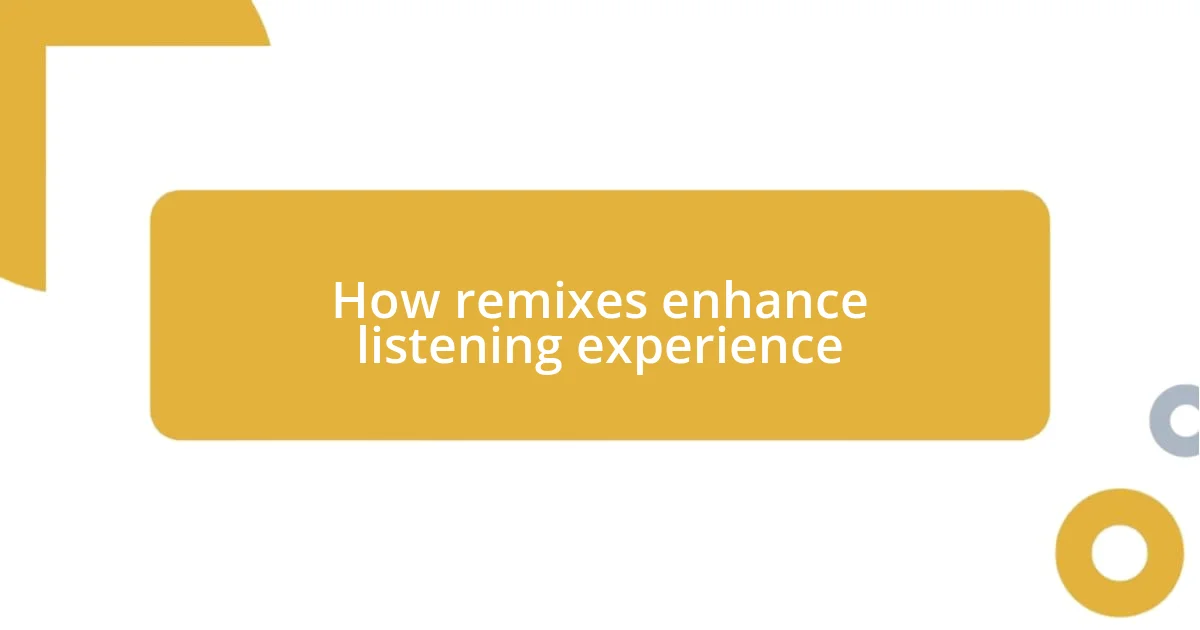
How remixes enhance listening experience
It’s intriguing how remixes can completely transform my listening experience. I remember attending a festival where a renowned DJ played a mashup of my favorite track. The original was a summer anthem, but this remix twisted it into a high-energy electronic explosion that had everyone on their feet. I felt an undeniable rush, realizing that the remix highlighted a side of the song I hadn’t noticed before, enhancing my appreciation for it in a thrilling new light.
There are times when I find remixes turn familiar tracks into sonic adventures. Recently, I danced to a remix that infused a classic rock song with reggae vibes. It was a delightful surprise! I couldn’t help but smile, feeling like I was exploring uncharted territory while still being rooted in a song I loved. Isn’t it amazing how a simple twist can make you rediscover music all over again? Such experiences reinforce my belief that a remix isn’t just a rehash—it’s an invitation to experience music in fresh ways.
What truly captivates me is how remixes often tell a story in ways the original can’t. I once came across a remix of a ballad that amplified its emotional weight by weaving in spoken-word elements. As the artist’s voice combined with the music, I found myself reflecting on my own life stories and struggles. It’s in these moments that I realize remixes can connect deeply with listeners, resonating on a personal level far beyond the surface. Could this ability to evoke reflection be one of the strongest gifts that remixes offer?
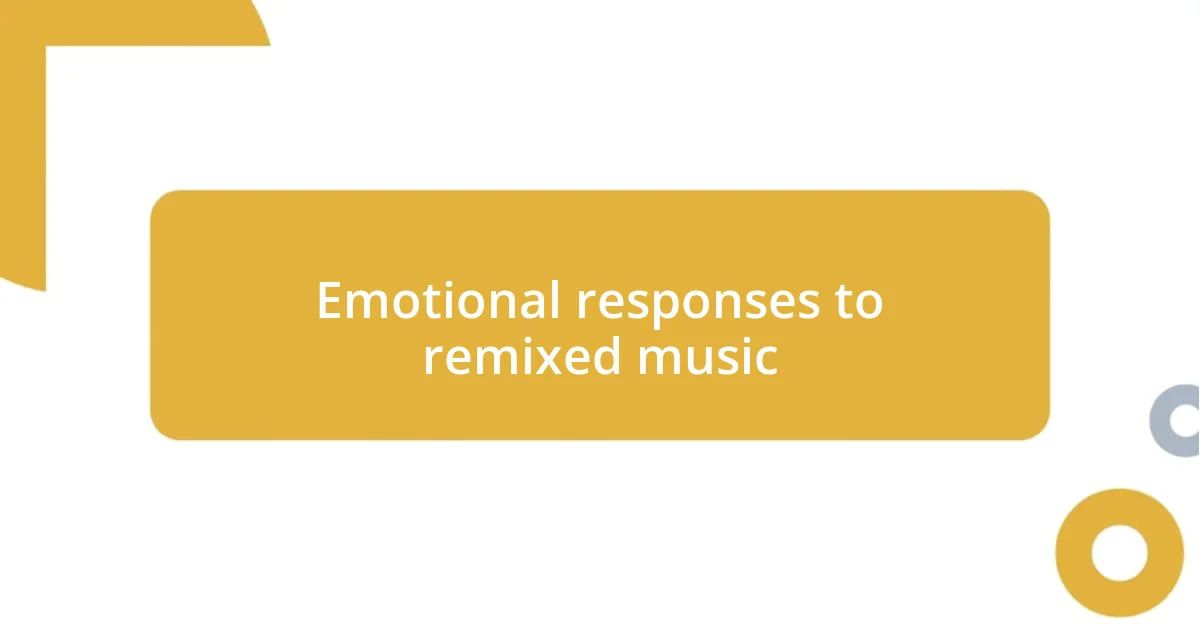
Emotional responses to remixed music
The emotional responses to remixed music often surprise me in how they can evoke feelings I didn’t expect. For instance, I recently listened to a remix of a classic R&B track that took a bold turn into deep house. The ebb and flow of the beat created this hypnotic effect that made me feel transported. I found myself smiling, almost as if I was experiencing a nostalgic dream, which left me wondering: Can music really tap into memories we didn’t even know we had?
Sometimes, remixes resonate on a deeper level than the original songs. I recall hearing a remix of a powerful anthem that replaced its fierce energy with a more subdued, introspective tone. It felt like the artist was asking us to step back and reflect rather than rally for change. I distinctly remember sitting in my room, completely immersed in the sound, and being struck by how such a shift could turn a battle cry into a moment of personal reflection. Isn’t it fascinating how remixes can reflect different facets of our emotions?
What really excites me is how the emotional landscape of a remix can mirror the complexities of life. I once heard a remix that combined a soul track with tribal drums, and it reminded me of the rollercoaster of emotions I feel in my own journey. As the rhythms built and fell, I experienced everything from exhilaration to calm introspection. It made me think: How can music, particularly remixed music, serve as a soundtrack to our evolving emotions? In those moments, I realized that remixes often capture the essence of life’s unpredictability, inviting us to embrace every part of the experience.






